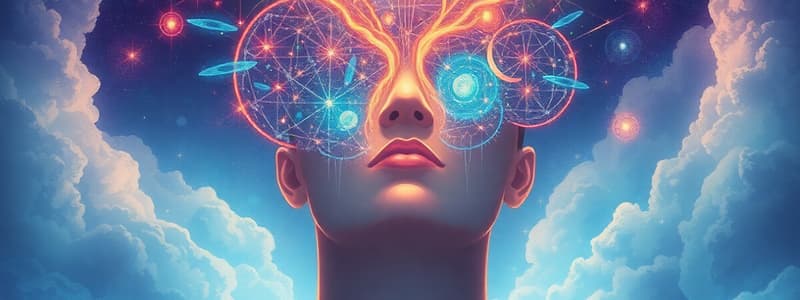Podcast
Questions and Answers
Which type of self-concept represents who you aspire to be?
Which type of self-concept represents who you aspire to be?
- Ideal self (correct)
- Personal self
- Actual self
- Ought self
What type of self-awareness focuses on how one is perceived by others?
What type of self-awareness focuses on how one is perceived by others?
- Public self-awareness (correct)
- Emotional self-awareness
- Cognitive self-awareness
- Private self-awareness
Which stage in Erikson's psychosocial development involves forming intimate relationships while maintaining personal identity?
Which stage in Erikson's psychosocial development involves forming intimate relationships while maintaining personal identity?
- Generativity vs. Stagnation
- Identity vs. Role Confusion
- Integrity vs. Despair
- Intimacy vs. Isolation (correct)
Which emotional regulation strategy involves changing thoughts to alter emotional responses?
Which emotional regulation strategy involves changing thoughts to alter emotional responses?
What component of self-esteem reflects a belief in one's abilities?
What component of self-esteem reflects a belief in one's abilities?
Which of the following influences self-esteem the most during development?
Which of the following influences self-esteem the most during development?
What is a common outcome of low self-esteem?
What is a common outcome of low self-esteem?
Which factor is NOT typically associated with the development of identity?
Which factor is NOT typically associated with the development of identity?
Flashcards are hidden until you start studying
Study Notes
Psychological Self
Self-concept
- Definition: The overall perception and understanding of oneself, encompassing beliefs, feelings, and thoughts about personal attributes.
- Components:
- Personal attributes (traits, abilities)
- Social roles (relationships, responsibilities)
- Values and beliefs
- Types:
- Actual self: Who you believe you are
- Ideal self: Who you aspire to be
- Ought self: Who you feel you should be based on external expectations
Self-awareness
- Definition: The ability to recognize and understand one's own emotions, thoughts, and behaviors.
- Types:
- Private self-awareness: Reflecting on personal traits and feelings.
- Public self-awareness: Understanding how one is perceived by others.
- Benefits:
- Enhanced decision-making
- Improved emotional regulation
- Better interpersonal relationships
Identity Development
- Definition: The process of developing a distinct personality and sense of self over time.
- Stages (according to Erikson's psychosocial development):
- Identity vs. Role Confusion (adolescence): Exploration of different roles and beliefs.
- Intimacy vs. Isolation (young adulthood): Forming intimate relationships while maintaining personal identity.
- Influencing Factors:
- Family dynamics
- Cultural background
- Life experiences
Emotional Regulation
- Definition: The ability to monitor, evaluate, and modify emotional reactions to achieve desired outcomes.
- Strategies:
- Cognitive reappraisal: Changing thoughts to alter emotional responses.
- Suppression: Trying to inhibit emotional expression (less effective).
- Problem-solving: Addressing the source of negative emotions directly.
- Importance:
- Reduces stress and anxiety
- Enhances relationships and well-being
Self-esteem
- Definition: The subjective evaluation of one's worth or value.
- Components:
- Self-confidence: Belief in one's abilities.
- Self-respect: Value placed on oneself, influenced by achievements and social acceptance.
- Levels:
- High self-esteem: Positive self-image, resilience to criticism.
- Low self-esteem: Negative self-image, sensitivity to criticism, risk for mental health issues.
- Influences:
- Early experiences and feedback from others
- Societal standards and expectations
These concepts interact and contribute to an individual's psychological self, affecting overall mental well-being and behavior.
Psychological Self
- Self-concept is how we perceive and understand ourselves, encompassing our beliefs, feelings, and thoughts about our attributes, social roles, and values.
- It includes our actual self (who we believe we are), ideal self (who we aspire to be), and ought self (who we feel we should be based on external expectations).
Self-Awareness
- Self-awareness is the ability to recognize and understand our emotions, thoughts, and behaviors.
- Private self-awareness involves reflecting on our personal traits and feelings, while public self-awareness involves understanding how others perceive us.
- Benefits of self-awareness include enhanced decision-making, improved emotional regulation, and better interpersonal relationships.
Identity Development
- Identity development is the process of developing a distinct personality and sense of self over time.
- According to Erik Erikson's psychosocial development theory, adolescence involves identity vs. role confusion, where individuals explore different roles and beliefs.
- In young adulthood, individuals face the stage of intimacy vs. isolation, where they form intimate relationships while maintaining their personal identity.
- Family dynamics, cultural background, and life experiences all influence identity development.
Emotional Regulation
- Emotional regulation is the ability to monitor, evaluate, and modify our emotional reactions to achieve desired outcomes.
- Cognitive reappraisal involves changing our thoughts to alter emotional responses, while suppression involves trying to inhibit emotional expression, which is less effective.
- Problem-solving addresses the source of negative emotions directly.
- Emotional regulation reduces stress and anxiety and enhances relationships and well-being.
Self-Esteem
- Self-esteem is the subjective evaluation of our own worth or value.
- It includes self-confidence, the belief in our abilities, and self-respect, the value we place on ourselves, influenced by achievements and social acceptance.
- High self-esteem is characterized by a positive self-image and resilience to criticism, while low self-esteem is associated with a negative self-image, sensitivity to criticism, and a risk for mental health issues.
- Early experiences and feedback from others, as well as societal standards and expectations, influence self-esteem.
Studying That Suits You
Use AI to generate personalized quizzes and flashcards to suit your learning preferences.



